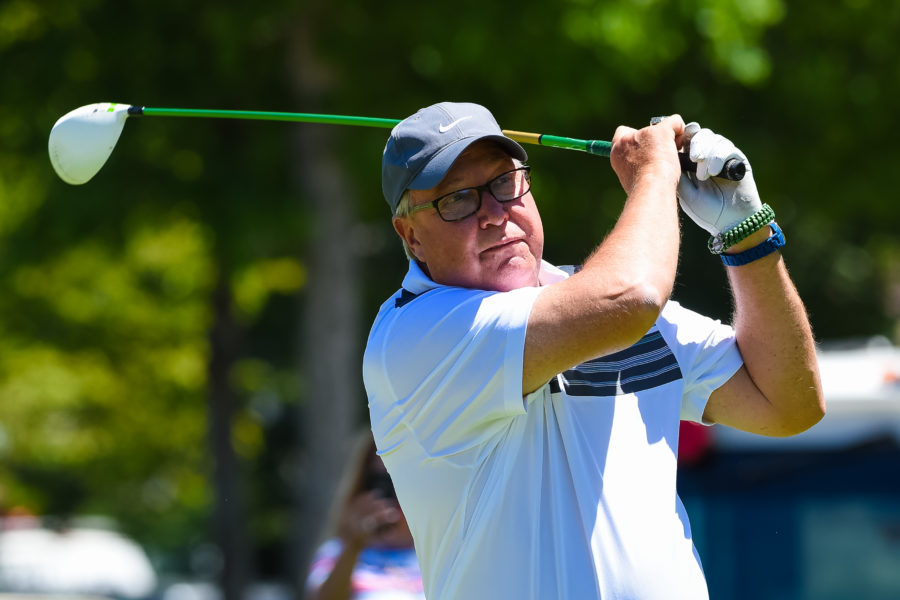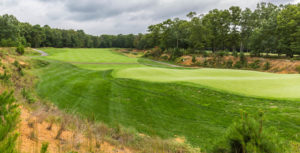
Ron Jaworski. 2016 Ron Jaworski Celebrity Golf Tournament at Blue Heron Pines in Egg Harbor City, NJ on June 13, 2016.
Long before he ever threw an NFL pass or became a popular analyst for ESPN, Ron Jaworski began what turned into a lifetime love affair with golf.
This, for someone who grew up in upstate New York. Where, as he puts it, “the golf season only lasts about four days a year.”
Nonetheless …
“There was a nine-hole public course that, if I wanted to play, I’d go to the second hole,” said the man who’s better known as Jaws from his decade (1977-86) of playing quarterback for the Eagles. “I couldn’t afford to pay for a round so I snuck on. There was actually a par 3, I think like the fourth or fifth hole, that was right near the middle school I went to. At lunch, we’d grab a sandwich and go try to hit the ball across the water. That was our lunch break. It made me really, really enjoy the game. Ever since then, I’ve been hooked on it.”
The course, South Park, is still there. Jaworski, who’s now 67, has driven by it many times on his trips back home. And all those early memories remain.
“I haven’t played it in a long, long time,” he readily acknowledges. “But for me, that’s where it started. I think I could get over the water with a little less effort these days. I mean, it’s only about 110 yards. But back then… .”
A second-round draft pick out of Youngstown State by the Los Angeles Rams, he came to the rebuilding Eagles and helped lead them to a Super Bowl. Then he made a name for himself on television. And along the way, he’s built a golf empire that currently includes seven courses, five in South Jersey and two in Pennsylvania.
“Over the years we’ve either managed or owned twenty golf courses,” Jaws said. “I never would have thought. I would’ve been happy with one golf course. Then, as we developed the business model, we realized it could be a nice nest egg down the road.”

Running Deer
The “we” in that equation would be his family, namely wife Liz and son BJ, who has a plus two handicap.
“When we started, I was still doing my thing professionally,” he noted. “So, I had to have people I could trust. That’s how my family got involved. It was a lot of hard work, by a lot of people. It wasn’t just me.”
In 1979, he and teammate John Bunting leased and managed the Abington Club, a nine-hole facility and health club in Jenkintown.
“I’d always been one of those guys who thought, ‘Hey, my career could end on the next play,’” Jaws explained. “For whatever reason, I understood that this wasn’t going to last forever. In the back of my mind, I wanted to keep my options open for when my playing days were over. So that’s where I kind of cut my teeth on the business of golf. We had a partner, Hugh Reilly, who came from a family of golf fanatics. He taught me.”
A few years later the “next step” was working at Burn Brae in Upper Dublin, which became Twining Valley. But the big move in the process was purchasing a club near his South Jersey home, Tall Pines, which was in bankruptcy. He was able to buy it from the bank. Which meant the ante had gone up. Considerably.
“Now I had to get serious about it,” he said, “because I invested my money. I absolutely loved turning that place around. It was a phenomenal facility, a cool place. It was like THE place in Gloucester County for like 15 years.”
Of course, most people remember it for what it was renamed, Eagles Nest. Only made sense, right?
As he was growing the company, he ran a course in York, PA and another in Delaware. Then, in the late 1990s, someone made him an offer he couldn’t turn down. So, he didn’t. And he figured that was pretty much that, as far as golf was concerned. He was wrong.
“The money just blew Liz and me away,” he recalled. “We could work the next twenty years and not make that. So, we were out. We had a non-compete clause for a year. After that, we decided to start it up again.”
And the rest, as the cliché goes…
“You have to have a strategic plan when you’re going in,” said Jaworski, who has a reputation of being a shrewd negotiator and no-nonsense operator. “Number one, you can’t overpay. Then you’re just trying to dig out of a hole. Normally, I will find a distressed property that’s been run down, and someone wants to get rid of it. They’re tired of it. So, you run the numbers to see if it’ll work.
“We have a great team. Charlie Clark is our executive superintendent. He’s my right hand. We go in, see what’s there, come up with a budget and make decisions. Fortune Magazine wrote about my model. It’s out there. It’s what I do. One thing I truly believe in, and it makes a difference, is that nobody is going to outwork us. I felt that way as a player. I was never the biggest, the fastest, strongest or smartest. But I would find a way to beat you, because I was going to outwork you.”
Jaworski’s properties are Blue Heron Pines, RiverWinds, Running Deer, Valleybrook, Ramblewood, Downingtown and Honeybrook. Anybody who saw the before and after pictures from Blue Heron can attest to what Jaws was able to do in a relatively short period of time to bring a once-heralded track back to its former stature. And in fact, even made it better, mainly by removing the excess peripheral gunk that had accumulated through years of neglect and addressing the in-house service needs. It’s a formula he’s put in place at every location.
“The first thing is, it has to have good bones,” Jaws said. “Blue Heron [which he took over in 2012] had great bones. It’s user-friendly, but you can make it really tough. It just wasn’t getting the proper attention it needed. I’d played it. I knew what it could be. I knew it could be polished up. We didn’t skimp. We went in there for a week and cleaned all the nasty stuff out. Made it playable again. So, five-and-a-half-hour rounds became 4:15. It was shock and awe. People couldn’t believe it was the same place. It became the place to go to down the shore.”
In many ways, he’s even more proud of Running Deer, which hosted a U.S. Open qualifier last year.
“And it held up,” he beamed. “The winning score was even par. Oh my God. We have four GAP teams. And last year our No. 1 team [beat] Merion out [for a spot in Division AA]. That was kind of the talk of the area.
“I threw a party for the guys.”
Jaws will be the first to tell you that the biggest part of making it is all the offerings beyond greens fees.
“Margins are slim,” said Jaworski, who is looking at potential opportunities in Florida, in part because so many of his members go there in the winter. “We’ll do 107 weddings this year at Blue Heron. That’s mind-boggling. And that’s Liz’s side of it. She’s the president of the corporation. Her attention to detail is crazy. In 2018 we did 357 weddings [total], and we don’t do them at RiverWinds. That’s important.
“There’s no magic wand, like ‘Oh, we’re going to get this property and it’s going to be great.’ That’s why I get so much satisfaction from seeing it turn around. We have close to 500 members [at Running Deer] when everyone is dying for members. In Pittsgrove. I always hear how you’re going to lose money here. I don’t have time for that belief. Everything has to work. Not only the golf. It’s about social events, and being a neighborhood place.
“I’m in a good spot in my life. I don’t have to beat up people for an extra five dollars to play a round. You know me, I’m in the bar talking to people. I love that. And I love to hear what they have to say. We listen. We want to be affordable. My wife always says, ‘Do the right things.’ We want our customers to have a great experience.”

